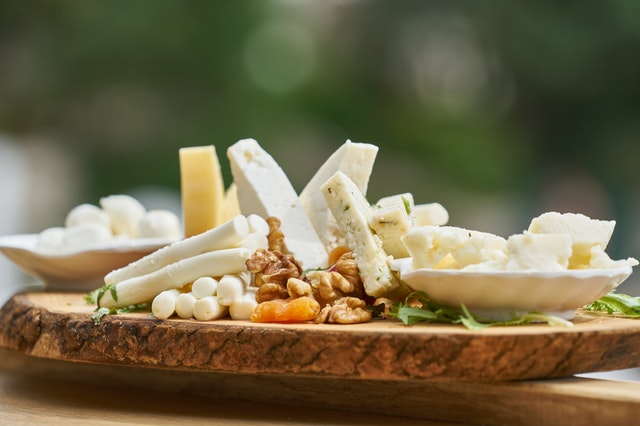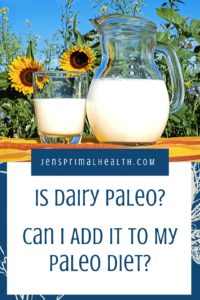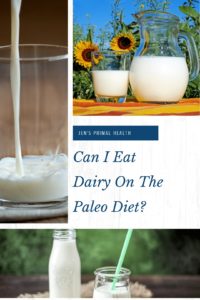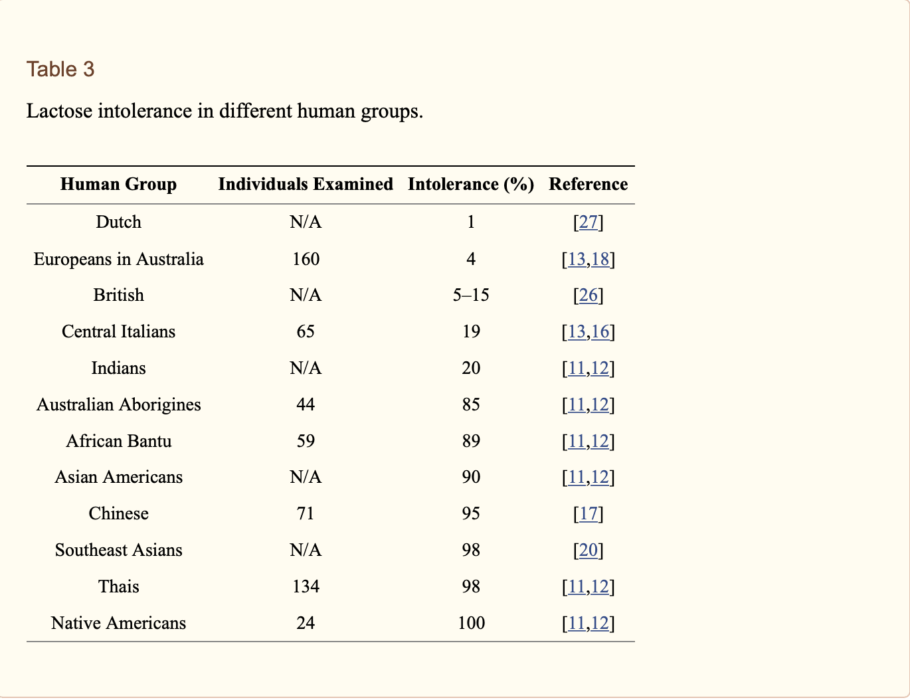I earn a small commission via affilate links at no extra cost to you.
This question comes up a lot for paleo beginners. Let’s face it. It’s been drilled into us since infancy to drink our milk. “Milk does a body good.” First let me clarify that when I’m talking about dairy I’m only talking about milk, cream, cheese, and all of the other dairy products that are made with milk. Somehow eggs were lumped in with dairy and in the paleo world, they’re not in the same category. To answer the question is paleo dairy-free depends on you, your goals, your genetics, and your gut health. When you’re done reading this you’ll likely be surprised that there are so many nuances to dairy and health. Depending on your goals and genetics some will argue that dairy on the paleo diet is perfectly acceptable.
Dairy Casein & Gluten Sensitivity
A simple first question to ask if you’re wondering is paleo, dairy-free, the best option for you, is how do you tolerate gluten? If you have issues with gluten then odds are that dairy doesn’t work for you either. There’s a protein in dairy called casein that affects the gut the same way that gluten does. Gluten over time creates leaky gut for most people and dairy can have the same effect. Reading up on the latest health research they’re linking leaky gut to a wide range of health problems. Autoimmunity, autism, mental health, skin conditions, digestive issues, asthma, thyroid issues, metabolic syndrome, and others all have ties to leaky gut. You can read more about the role that grains have on the gut and body in this blog post.
The other side to the casein story is that there are different types. Most of the dairy that is produced in this country is A1 casein which is the type people are least likely to tolerate. Recently however I’ve noticed A2 milk at the grocery store. A2 casein is tolerated slightly better than A1. You can also find A2 casein in goat milk, goat butter, and goat cheeses. Dairy made from sheep is also A2 casein.
Dairy Addiction?
One of the biggest hurdles most people have about giving up dairy is their morning coffee. I get it. I used to be one of those people who didn’t think I could ever drink black coffee. Now, I feel like the coffee is missing if there’s anything added to it. What I’ve learned is that not all coffee is created equally. If you’re buying pre-ground coffee and using an old crusty coffee maker that has built-up residue it’s time to step up your game. You can read about my brewing tips here to make your dairy-free coffee transition easier.
The other challenge people have is that they can’t imagine life without cheese. Let’s face it, we put cheese on nearly everything in this country. Remember the casein I mentioned above? In the body, it metabolizes into casomorphin.
A number of studies have revealed that casomorphins lock with opioid receptors, which are linked with the control of pain, reward and addiction in the brain. [1]
It’s one of those things that they don’t mention in dairy marketing. “Have milk daily to get your opioid fix.” I imagine that wouldn’t sit too well with moms. Either way, it’s something to be mindful of. Do you struggle to give up dairy because you’re simply addicted to it? I have to say that I’ve experienced this addictive quality of dairy myself. Currently, I don’t eat much dairy but I’ve found that after socializing over a cheese tray I craved cheese the next day. It’s interesting when you suddenly have a craving for something that you rarely even consider. Determining whether your version of paleo is dairy free is definitely something you should consider or at least experiment with.
Raw Dairy On The Paleo Diet?
Studies show that raw dairy has more health benefits than pasteurized dairy. Among other things, it boosts glutathione levels (the body’s ultimate detoxifier).
Researchers tracked 983 infants from rural areas in Austria, Finland, France, Germany, and Switzerland through the first year of life, finding that raw milk consumption protected against rhinitis, otitis, fever, and respiratory tract infections. Raw milk-drinking babies also had lower C-reactive protein levels than other infants. Overall, raw milk consumption in the first year of life reduced the chance of fever and respiratory infections by 30%. Similar results were found among infants consuming raw milk boiled at home, but the associations were weaker than for untouched raw milk. [2]
When dairy is pasteurized there are elements that would normally help us digest it that get destroyed. I’m still on the team “we pasteurize it for a reason”. While raw milk inhibits bacterial contamination it can still contain pathogens. Getting sick from raw dairy is rare but when it happens it’s serious. You could end up in the hospital. [2]
What Is Your Genetic Inheritance?
Looking at diary from a Paleolithic perspective where do your ancestors come from? People from northern latitudes didn’t receive much sunlight on their skin throughout the year, and very little, if any, during the winter months. A person’s ability to digest milk gave them a source of Vitamin D (typically made when the skin is exposed to the sun) and calcium which makes bones stronger. If your bones are stronger you’re more likely to survive. During the Paleolithic period, the top 3 causes of death were infant mortality, infection, and injury. If you didn’t break a bone and die from an injury you had a greater likelihood that your genetics would make it to the next generation.
Most humans before the neolithic revolution (10,000 years ago) were lactose intolerant, i.e. their paleo diet was dairy free. When we began domesticating animals the genetic variant of lactase persistence enabled more humans to tolerate lactose after infancy. (Lactase is the enzyme needed for the body to digest the milk sugar lactose.) People of Northern Europe drank raw dairy as recently as the time of the Roman Empire. Their Southern European counterparts didn’t and consequently today we see more lactose intolerance in people from Southern Europe. [3]
Conversely, if you have genetic ancestry from the equatorial region of the planet your ancestors wouldn’t have had to rely on this food source. Plantlife is abundant year-round so if someone found that dairy upset their stomach they wouldn’t “need” to consume it. They definitely wouldn’t have needed dairy for Vitamin D due to the plentiful sunshine. Their bone strength and decreased susceptibility to rickets (Vitamin D deficiency) would have removed that natural selection pressure; that would have been one thing they weren’t as likely to die from.
Looking at Africa it seems that the pockets that have the best lactose tolerance are those who began raising animals. Compared to Europeans, Africans began raising animals much more recently which partly explains why their level of lactose tolerance isn’t at high as it is for Northern Europeans. Even then, there are different gene variants, even different variants among different African populations, that have increased their lactose tolerance. [4] In times of drought, dairy could have been a source of water. If you could survive a drought then once again, survival allows genes to be passed to the next generation.
Should You Adopt A Dairy Free Paleo Diet?
Like I said before. It depends on you. What I do recommend is removing it for 30 days in conjunction with pretty strict adherence to the paleo diet. Most people have a gut health issue of one form or another and by reducing systemic inflammation you’ll get a pretty clear signal if it works for you when you try it out a month from now. When I gave up dairy I didn’t think I had an issue with it. However, when I tried adding it back in 2014 I had the most horrible reaction. Within about 30 minutes I felt as if I’d drank everything behind the bar. The room spun, I felt dizzy, I had a gross dairy taste in my mouth that made me want to hurl, and I remember laying on the couch with 1 foot on the floor. Nasty. I finally decided to go to bed to sleep it off.
Today, I use Kerrygold butter and occasional heavy whipping cream but most of the time I have zero interest. Dairy has always been odd to me. Can you imagine the first person who said “I want to drink the white stuff coming out of the dangly thing on that animal?”
[2] https://www.marksdailyapple.com/is-raw-milk-really-better/
[3] Silanikove, Nissim et al. “The Interrelationships between Lactose Intolerance and the Modern Dairy Industry: Global Perspectives in Evolutional and Historical Backgrounds.” Nutrients vol. 7,9 7312-31. 31 Aug. 2015, doi:10.3390/nu7095340 https://www.ncbi.nlm.nih.gov/pmc/articles/PMC4586535/
[4] https://www.nytimes.com/2006/12/11/science/11evolve.html
Originally posted on February 8, 2020 @ 10:21







Comments are closed.